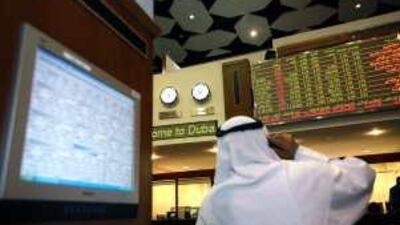A post-Eid spending spree among international investors sent Dubai shares to a 10-month high on Wednesday. The Dubai Financial Market (DFM) General Index led gains among UAE stock exchanges, with the biggest rise being recorded by the exchange's own shares. The DFM, the only Gulf stock market to sell shares to the public, was up 11 per cent.
"We have rising sentiment towards the UAE coupled with valuations that are discounting too harsh an outlook for the economy," said Fahd Iqbal, the vice president of EFG-Hermes Research. "There's also the spillover effect from the ongoing rally in global markets." More than Dh2 billion (US$544.5 million) has been pumped into the nation's stock markets by foreign investors from the start of April until now, the Minister of Economy, Sultan al Mansouri, said this month.
The rally comes after an announcement of an upgrade before the Eid al Fitr break of UAE stock markets to "emerging market" status by the FTSE Group, a leading stock index provider. Index providers' decisions can significantly affect flows of capital into stock markets and are used by many institutional investors to allocate funds. FTSE, which publishes the FTSE 100 index in London, said the UAE's move to "secondary emerging market" status would be effective from September next year.
Attempts by Dubai to restructure its corporate holdings and manage its debt have also helped buoy investor sentiment. Dubai Government bonds have been rising steadily since last month and continued to climb last week. On the first day of trading after the Eid al Fitr public holiday, the DFM General Index rose 3.6 per cent to its highest level since November 18 last year. The Abu Dhabi Securities Exchange General Index also climbed to its highest since November last year, up 1.4 per cent.
"There have been signs since early summer that the valuation gap has been increasing between regional markets and other emerging markets and this is steadily attracting international money as concerns about Dubai's economy have been shown to be exaggerated," said Fadi al Said, the head of equities at ING Investment Management. Financial support given to the UAE's banking sector by the Central Bank and a stabilisation in oil prices were also helping attract investors, he said.
The oil price has been supported by a weak dollar, which touched a year low against the euro on Wednesday. Because oil is priced in dollars, it becomes cheaper when the currency declines in value. Oil prices fell below $69 per barrel on Wednesday after a report in the US that said global demand for energy remained weak. Sultan Ahmed bin Sulayem, the chairman of the Government-controlled holding company Dubai World, said in an interview last week that the financial crisis for Dubai had passed its nadir.
Markets in Oman, Kuwait and Saudi Arabia were still closed on Wednesday for the Eid al Fitr public holiday. Among Wednesday's biggest gainers was Arabtec Holding, which rose to its highest level in 11 months after the Russian energy giant Gazprom won final approval to build what may become Europe's tallest skyscraper. The Dubai-based firm is the main contractor on the project. The holding company Dubai Investments gained as much as 10 per cent, and Emirates NBD, the UAE's biggest bank by assets, climbed 1.9 per cent. The Abu Dhabi-listed Gulf Pharmaceutical Industries rose more than 8 per cent after saying it would start producing a H1N1 vaccine early next year.
Qatar's DSM 20 Index increased 2.3 per cent while Bahrain's measure was little changed. tarnold@thenational.ae

